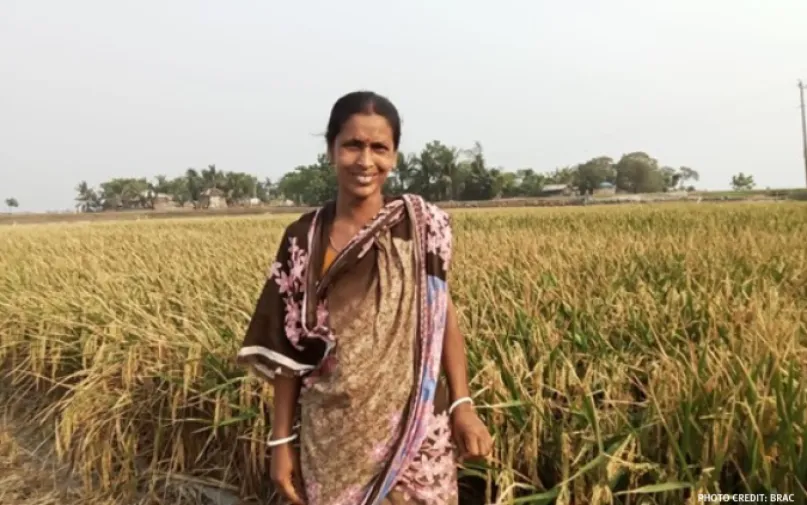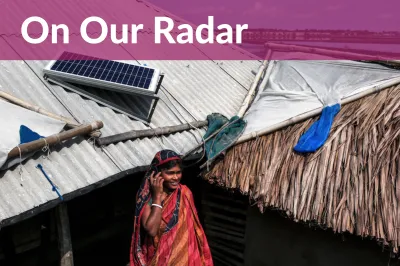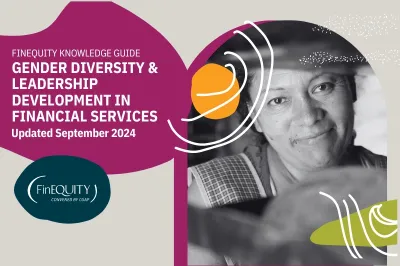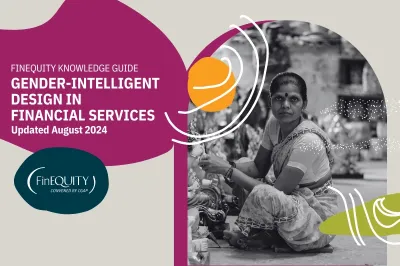Member Spotlight: Dr. Rohini Kamal
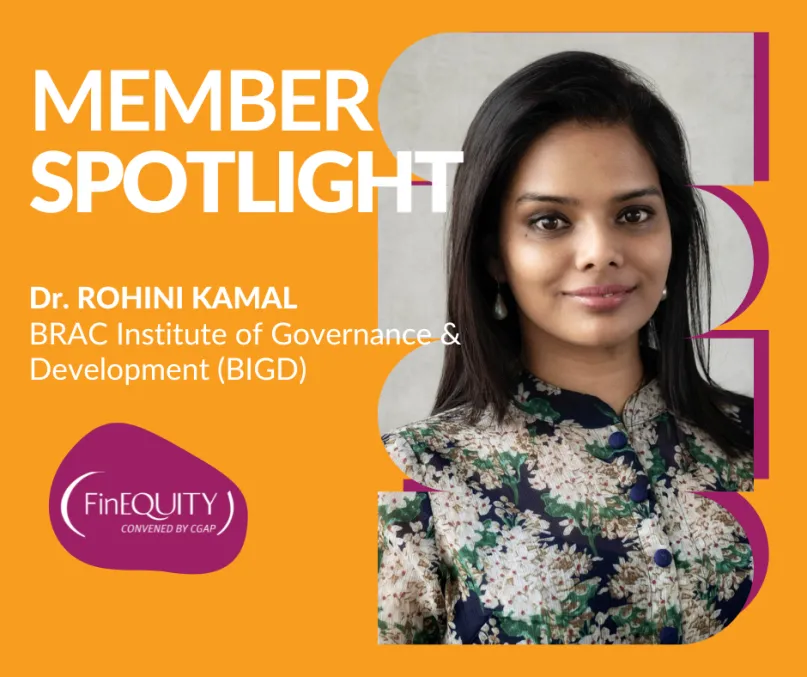
FinEquity: Tell us a little bit about yourself. A fun fact? Something that might surprise most people? Your superpower?
Dr. Rohini Kamal: My name is Rohini Kamal. I am a Research Fellow and Assistant Professor on the Master’s in Development Studies program at the BRAC Institute of Governance and Development (BIGD). BIGD is a social science research and academic institute under Brac University in Bangladesh. BIGD conducts research around four broad clusters: economics, governance, gender, and environment and l lead the environment and climate cluster.
Our work is focused on understanding household welfare and livelihood impacts from climatic and environmental changes, as well as impacts from human interventions. These include both adaptive and mitigative actions. We use field experiments including randomized controlled trials to assess more localized and household-level impacts of programmatic, policy, and information interventions in the field of climate change. We also use macroeconomic models to estimate employment and environmental interdependencies between different sectors of the economy.
Although I am now working in economics, it might surprise many people to know that I spent most of my life trying to be a physicist. I suppose both involve trying to make some sense of the world around us!
FinEquity: What originally drew you to the women’s financial inclusion and economic empowerment sector? What has kept you here?
Dr. Rohini Kamal: It started with wanting to create better solutions to address the impacts of climate change. During my Master’s research, I had focused on the technical aspects of how to better use climate models for urban policy. However, I soon realized it wasn't exactly the science or accuracy of the model that was the biggest roadblock, but that there were other considerations and barriers hindering the world from adopting recommended climate solutions. People also had to deal with different socio-economic challenges.
I also realized that the impacts of climate change and therefore the solutions are not the same for everyone. So, I started looking at who gets impacted the most and found that women were mostly affected by climate change. In fact, it turned out that women were and still are disproportionately dependent on natural resources, and often are the first responders when climate shocks occur. In a nutshell, this is how I eventually found myself working at the intersection of climate change and gender.
FinEquity: Any current projects you’re working on/or recently worked on that you find particularly exciting/engaging?
Dr. Rohini Kamal: BIGD is currently looking at how existing anti-poverty mechanisms such as social safety nets and developmental programs can build climate resilience for both slow onset and sudden climate risks. Another project is exploring how anticipatory action can minimize disaster impacts such as those resulting from floods. We also have an upcoming project that will focus on women’s employment in the green growth agenda to ensure just transitions in Bangladesh.
Being based in Bangladesh means we have a great opportunity to learn from communities that have not only suffered from environmental disasters, but have also led the way in climate resilience. Bangladesh is one of the most climate vulnerable countries in the world, facing cyclones, rising sea levels, floods, and droughts. These disasters are not only becoming more frequent and severe, but they are also becoming more unpredictable.
To address these threats, programs such as BRAC’s flagship Ultra-Poor Graduation (UPG) program and World Vision International’s program in Bangladesh are now evolving to work with climate vulnerable communities.
BIGD is working on this program to evaluate how traditional offerings can be combined with other innovative solutions like drought resistant crop varieties, insurance-type products, disaster risk reduction programs, and informal cooperation mechanisms to pool risks against climate impacts.
Ratna Mridha, a participant of UPG program, works in the paddy cultivation in one of the most saline-prone areas in Debhata, Satkhira. In the last 50 years, there has been no rice cultivation in the area. Traditionally, the people of Debhata have been practicing shrimp farming because of the high level of soil and water salinity and insufficient water for irrigation during dry seasons.
Our work reveals that the Ultra-Poor Graduation (UPG) program’s focus on women plays a key role in communities where women face discrimination when working outside their homes. Differential norms not only limit access to resources, but also authority over resources and decision-making.
The UPG program explicitly focuses on improving women’s participation in decision-making, which, in turn, strengthens their ability to respond to disasters. It includes regular meetings, either weekly or bi-weekly, with other participants. This improves response networks, enhances awareness, and increases the chances of receiving assistance during crises. Strong community bonds can be vital in disasters and in coping with slow-onset climate change impacts by increasing the number of individuals from whom one could seek help. Women tend to be more home-based and may therefore miss opportunities to form networks with peers. Forming relationships with one’s neighbors is vital to access their support during emergencies, especially in urban settlements where extended family support may not be available.
FinEquity: What have been some of the most impactful findings you’ve come across in your career? What about in the last few years?
Dr. Rohini Kamal: The most moving and impactful insight from my work has been the evidence that climate impacts and access to solutions vary widely even within the same community that is experiencing climate shocks. Climate impacts play out within familiar and pre-existing fault lines. Our work has shown that addressing some weaknesses in the system through graduation programs, community engagement in local governance and accountability, and strengthening women’s access to decision making and resources can greatly minimize negative climatic impacts.
Conversely, any solution that does not specifically address underlying inequalities may counterintuitively exacerbate climate impacts, thus widening the gap between those who have resources to better adapt and those who don’t. For instance, in Bangladesh we have seen technological solutions like digitalization of social safety net disbursements or mobile banking widening disparities if these initiatives do not concurrently address the gap in women’s digital literacy.
FinEquity: What are your top priorities for the remainder of 2024 (and beyond) for your work?
Dr. Rohini Kamal: At BIGD, we are very much a field research center with a long history in development, governance, and gender research. Our priority going forward, will be to better integrate gender and governance lens within climate issues, the different gendered impacts and creating gender intentional climate solutions from a ground-up perspective, using mixed-method and interdisciplinary approach to better understand how impact plays out, what solutions work where, and how some solutions may not always benefit everyone in the same way.
In August, Bangladesh experienced a change in political regime following a mass uprising, that led to massive upheavals in the existing governance systems. As this occurred during the monsoon season, we saw how service delivery, health care, disaster response and social safety net provisions in response to pluvial flooding where severely impacted. The community stepped in to fill the void in an unprecedented way, showing the importance and scope for engagement in reducing climate impacts.
Exploring ways in which informal and formal governance mechanisms can carve out space for more civic engagement, how digital systems and financing services can play a role in including and organizing impacted communities to create checks and balances in climate governance will be key focus areas in the coming future.
FinEquity: What can our members connect with you about/what can they ask you about?
Dr. Rohini Kamal: My work assesses livelihood impacts from climatic and environmental changes, as well as from human responses to these changes. One of our current projects focuses on the inclusion of Bangladesh’s women farmers into agrivoltaics. To better understand barriers that can prevent women from benefiting from renewable expansion or digital financial services, we have taken our research into local communities. Through a field research center located within the community, our researchers can conduct in-depth ethnographic studies to assess uptake and differential impacts of different climate solutions. I would love to learn from others across the globe about their experiences when looking at inter-community and inter-household dynamics that prevent access to livelihood options and benefits to certain groups. Please connect with me on LinkedIn.
FinEquity: What role does FinEquity play in your work? Where do you see value in this community? How has being a member shaped your work?
Dr. Rohini Kamal: As a researcher I think its key that we share findings and learn from each other, particularly from different regions and different groups. For instance, we can learn about ways in which financial access has helped in different contexts, what supporting systems contribute to the difference in benefits to women and why. This would hopefully help us identify barriers to accessing benefits and find ways to minimize them.
